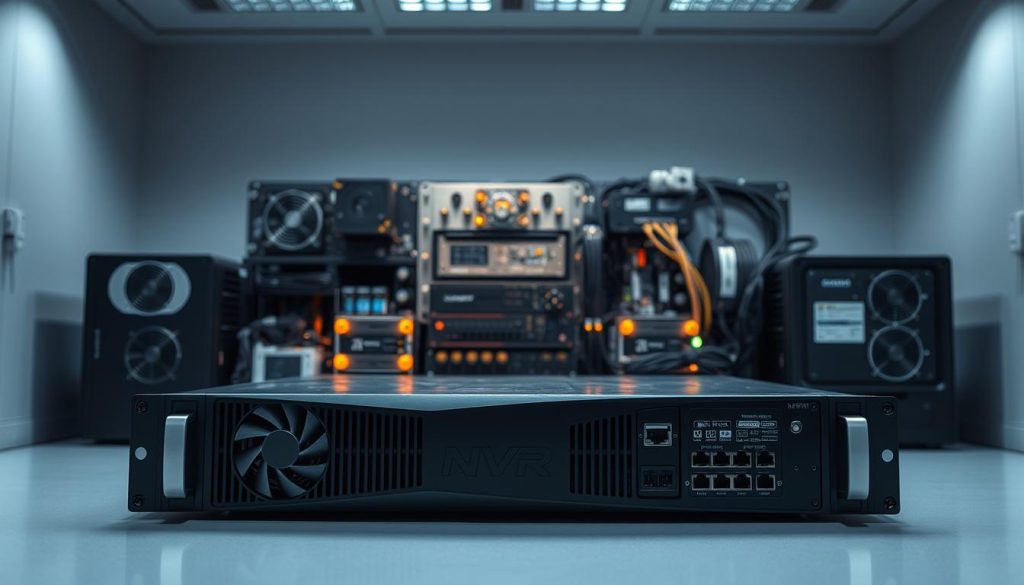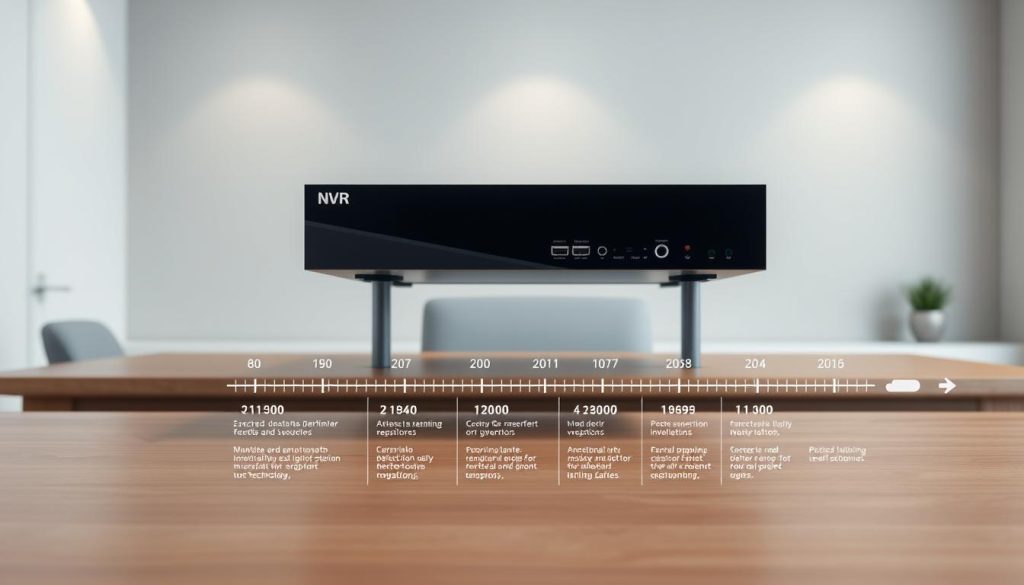Knowing how long an NVR lasts is key for anyone setting up a surveillance system. Network Video Recorders (NVRs) usually last between 3 to 10 years. This time can change based on how well you maintain it and the environment it’s in.
NVRs often last longer than Digital Video Recorders (DVRs) because of their advanced tech. Learning about NVR lifespan helps you pick the best equipment for your security needs.
Key Takeaways
- The average NVR lifespan ranges from 3 to 10 years.
- NVR longevity depends on maintenance and environmental factors.
- Compared to DVRs, NVRs can offer a longer lifespan.
- Understanding these metrics is key for smart investments.
- Proper usage can extend the life of your NVR.
Understanding Network Video Recorders (NVRs)
What is an NVR? It’s a device that handles video from IP cameras in a video surveillance system. NVR technology is key in today’s security systems. It’s different from traditional DVRs because it deals with digital data directly.
This means NVRs can be managed from one place and accessed remotely. This is a big plus over DVRs, which work with analog signals.
NVRs are available in different types, like Power over Ethernet (PoE) and non-PoE models. PoE NVRs make installation easier by using one cable for power and data. This cuts down on clutter and makes setup simpler.
On the other hand, non-PoE models need separate power sources. This might make installations more complex. But, they also offer strong video management features.
Factors Influencing the Lifespan of an NVR
The life of a Network Video Recorder (NVR) depends on several important factors. Knowing these can help extend the life of your device. Key factors include the quality of parts, the environment it’s in, and how often it’s used.
Quality and Durability of Components
The NVR quality greatly affects its lifespan. High-quality parts last longer. Components like electric circuitries are key to its performance. Cheap parts can fail quickly, costing more and reducing its use.
Environmental Conditions
NVR environmental influences can either help or harm its durability. Extreme temperatures, moisture, and physical damage can shorten its life. Keeping NVRs in safe places helps avoid these problems and extends its life.
Usage Frequency and Patterns
How often an NVR is used matters a lot. Devices that run all the time, like 24/7 recording, wear out faster. Adjusting how you use it can make it last longer.
Typical Lifespan of an NVR
The lifespan of an NVR can vary from 3 to 10 years. This depends on several factors. Knowing the average lifespan helps users plan for replacements.
Quality parts are key to an NVR’s durability. They help the device last longer under regular use.
Maintenance and updates also play a big role in NVR performance. Regular checks and software updates improve function and extend lifespan.
Compared to DVRs, NVRs last longer with proper care. Choosing a high-quality NVR and following maintenance tips ensures it works well for years.
How long will an NVR last?
The lifespan of an NVR can vary from 3 to 10 years. NVR longevity estimates depend on several factors. The environment and regular upkeep are key to reaching the higher end of this range.
Components’ quality greatly impacts an NVR’s durability. Keeping the firmware updated and following the manufacturer’s advice helps. This ensures the system works well for a long time, boosting security.
Maintaining Your NVR for Longevity
Keeping your network video recorder (NVR) in good shape is key. By following the right maintenance steps, you can make it work better and last longer.
Regular Firmware Updates
It’s important to keep your NVR’s software up to date. Updates fix problems and add new features. They also boost security and performance, helping you get the most out of your system.
Proper Ventilation and Temperature Control
NVRs need cool, well-ventilated spaces to work well. Heat can cause them to fail, leading to downtime or damage. Good airflow keeps your NVR at the right temperature, helping it last longer.
The Role of Storage Capacity in NVR Lifespan
NVR storage is key to your system’s lifespan and success. A bigger storage lets you keep video longer. This means you don’t have to keep overwriting, which can hurt the quality of your recordings.
Using new compression tech like H.265 helps a lot. It lets you store more without losing video quality. This way, your system can keep high-quality videos for longer.
It’s important to keep an eye on how much storage you have. Setting up alerts for when you’re running low can help avoid losing data. Knowing your storage limits helps you make smart choices about upgrades or changes.
Getting the hang of NVR storage is vital for good video surveillance. It makes your equipment last longer and boosts your security efforts. For more on NVR and other systems, check out this page.
Comparing NVR Lifespan to DVR Lifespan
When we talk about how long surveillance tech lasts, we often compare NVRs and DVRs. Network Video Recorders (NVRs) use advanced tech, making them last longer than Digital Video Recorders (DVRs). An NVR can last from 3 to 10 years, based on its parts and how it’s used.
DVRs also last a similar amount of time. But, they might become outdated faster because tech changes quickly. This comparison of lifespans shows NVRs are more reliable and last longer. They’re a better choice for keeping an eye on things for a long time.
Using Quality Components in Your NVR System
Choosing high-quality NVR components is key for a reliable surveillance system. These components improve performance and extend your system’s life. Using top brands means your NVR is built to last, handling constant use well.
A secure NVR setup depends on its components. Look for systems with strong processing, good storage, and durable build. This ensures your system runs smoothly and you can access footage easily.

System durability comes from the right components. With today’s tech, picking reliable parts makes a big difference. Choosing products from trusted makers gives you confidence in your system’s long-term performance.
Technological Advances Impacting NVR Longevity
The world of Network Video Recorders (NVRs) is always changing. New technologies make them last longer and work better. For example, H.265 coding helps save space on storage and reduces network use.
This means NVR systems can run smoothly for a longer time. They become more reliable and last longer.
Artificial intelligence is also changing NVRs. AI helps them work smarter and faster. This makes them more efficient and less prone to wear and tear.
Technology does more than just improve how NVRs store video. They now have cool features like motion detection and facial recognition. These use machine learning to get better over time.
These innovations don’t just make security better. They also help NVRs stay up-to-date and useful in today’s fast world.
Best Practices to Extend Your NVR’s Life
To get the most out of your Network Video Recorder (NVR), it’s important to follow some key steps. By doing so, you’ll not only improve its performance but also make it last longer. This includes setting it up right and keeping it clean and checked regularly.
Optimizing Settings for Efficient Operation
Changing your NVR settings can really help it last longer. Setting it to record only when it’s needed reduces wear and tear. Using motion detection can also help, making sure it only records when there’s movement.
Routine Cleaning and Inspections
Cleaning your NVR regularly is a must. Dust can block airflow and cause it to overheat, which is bad for its life. Here’s a simple routine to follow:
- Check and clean the vents to keep air flowing well.
- Look for any damage on cables and connections.
- Listen for strange sounds that might mean something’s wrong.
By sticking to these maintenance tips, you can make your NVR last longer and avoid expensive repairs.
Signs That Your NVR Needs Replacement
Knowing when to replace your NVR is key to keeping your security system working well. Look out for signs that your NVR might be nearing the end of its life. If it keeps malfunctioning or service keeps getting cut off, it’s time to worry.
Checking the video quality is also important. If the footage looks grainy or fuzzy, it means your NVR is having trouble. If this keeps happening, it might be time to get a new one.
Another sign is if your NVR can’t work with the latest tech. As new surveillance tech comes out, older NVRs might not keep up. This means you might need to troubleshoot NVR problems and possibly replace it.
- Frequent system malfunctions
- Degrading video quality
- Incompatibility with new technology
Conclusion and Future Considerations for NVRs
Understanding how to make Network Video Recorders (NVRs) last longer is key. It helps them work better and stay reliable for a long time. Keeping them in good shape and doing regular checks is important.
New advancements in surveillance tech are exciting. They make NVRs work better and last longer. Keeping up with these changes helps you choose the best NVR systems.
The future of NVRs looks bright. They will get even better, thanks to new materials and features. It’s important to stay updated and ready for these improvements.
Staying ahead of new trends is vital for security management. By focusing on upkeep and keeping up with NVR tech, your systems will stay effective. This ensures they meet today’s and tomorrow’s needs.

